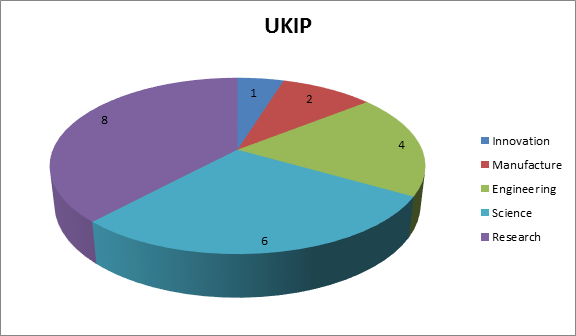Patents Trade Marks Designs Copyright
Part Five – Party Election Manifesto Analysis on Intellectual Property and Research and Innovation: UKIP
May 07, 2015
In the fifth and final piece of the Election Series, Mahir Raoof looks at what UKIP offer in their manifesto in regards to intellectual property, research and development and innovation.
Led by Nigel Farage, UKIP is a political party primarily driven by withdrawing from the European Union. Though it’s unsurprising that the bulk of their policies are often based around this theme, in previous years the party has been criticised for offering little else with no credible plans beyond leaving the EU and a massive clampdown on immigration which is commonly touted as a major cause of Britain’s economic and social problems.
So riding an unprecedented wave of popularity and having even been mentioned as a potential coalition partner, does the 2015 party election manifesto address those criticisms and has UKIP seized its opportunity to debate more of the lesser issue and show they are ready to govern?
Throughout the manifesto, there are few mentions of research, technology and innovation and no acknowledgement of any form of intellectual property. The word ‘research’ appears eight times but it should be stated that three of those mentions are references to external research carried out.
The focus of UKIP’s research and science policies are based around education and, in particular, driving up teaching standards with an emphasis on STEMM subjects (Science, Technology, Engineering, Mathematics and Medicine) perhaps in an effort to create future inventors and innovators. Policies include waiving university tuition fees for anyone who studies a STEMM subject at university and adjusting funding for the subjects to allow a greater uptake.
As stated, UKIP is heavily in favour of withdrawal from the European Union as they feel they reflect the views of the general public that Britain puts in more than it gets out from a fiscal perspective. According to figures from gov.uk from 2007 to 2013, ERDF (European Regional Development Fund) funding has helped 14,933 new businesses to start-up or move into local areas creating over 62,000 jobs. These businesses across the country include SMEs, universities, councils, enterprise partnerships – all of which have been heavily involved in innovation, new product development and research whilst helping to build a knowledge economy through developing new ideas. It would be interesting to know if the party take into consideration such initiatives when looking at the European Union and acknowledge such benefits that membership provides.
The party is for GM foods and has pledged to undertake research on the benefits and risks involved to the public as well as also pledging to invest an extra £130m into researching and treating dementia by 2017. On this basis, food and health industries will particularly benefit though there is little mention of the incentives and support the party will provide.
In conclusion, despite a much more comprehensive and professional manifesto, the party have yet to address in detail the lesser issues and have provided little information or pledges towards areas such as innovation, research and technology. Considering that UKIP was created with the primary objective of withdrawal from the European Union, it may be unlikely that they will address other issues until they achieve their ultimate aim.

For further information please get in touch with your usual contact at Swindell & Pearson or [email protected]